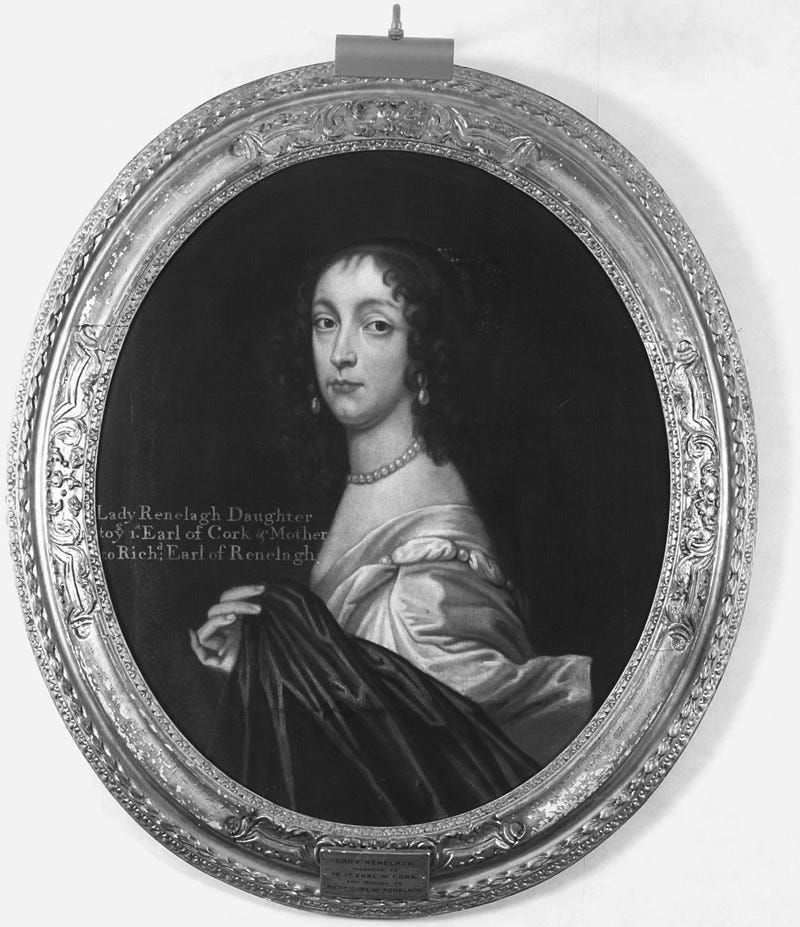The Kitchen-Physick of Lady Ranelagh #311
Women philosophers throughout history (3)
Dear friends of Daily Philosophy,
Before we begin with today’s article, let me briefly point you to a few things that might interest you:
Yesterday, I published the next instalment of the “Shortest Introduction to Ethics” video series, about the Social Contract. There are three more to come, and they will all be coming out on Friday evenings, at around 21:00 GMT/UTC (if I calculated this correctly). Here is the latest one in case you missed it:
Also, we have a new interview on the main Daily Philosophy site, this time with Jean Arnaud, pioneer of the digital renaissance in the fields of art, philosophy, technology, and education, and former literature and philosophy professor at Université Côte d’Azur. We speak with Mr Arnaud about AI and the Future. You can read the interview here:
https://daily-philosophy.com/interview-jean-arnaud-ai-future/
Finally, I have revived the Accented Philosophy Podcast, which has been hibernating for the past few months, since my co-host Ezechiel changed university. We all became busier, and it became more difficult for us to meet, plan and record the podcast. So now I’m doing it alone, and I will slowly, over time, work my way through all the old posts from this newsletter and make them into podcast episodes. I will be creative with how I adapt them, so they may not always be just audio versions of the newsletter. We will see. At the moment, we are discussing how to apply Aristotle’s philosophy of happiness to our everyday lives. If you’d like to have a look at the project, you will find it both on YouTube and on every podcast player under the Accented Philosophy name. Here is a link to the podcast on YouTube:
https://www.youtube.com/@dailyphilosophy/podcasts
And now, back to our topic!
In the past few weeks, we have been looking, among other topics, at famous women philosophers. In the first instalment of this series, we looked at ancient and non-Western philosophers in a kind of brief overview. I would like to return to some of these with longer essays in the future, but for the moment, let’s move on. If you missed that article, it’s right here:
The next article in this series looked at the life of Elisabeth, Princess of Bohemia. You can read more about this remarkable mathematician, philosopher, and friend and critic of Rene Descartes here:
In that article, I wrote:
Thinkers like Anna Maria van Schurman, Marie de Gournay, and Lady Ranelagh were members of a circle that regularly corresponded about philosophical issues.
I got this information from a book (cited in that article), but when I asked a few friends and colleagues who Lady Ranelagh was, nobody could tell me. This, of course, made her even more intriguing: I had to find out. Today’s article is the result of that search for an almost forgotten, but incredibly influential philosopher and scientist of the Early Modern period. Meet Katherine Jones, Viscountess Ranelagh.
Brothers and friends
Meet... who?
It seems to have been the destiny of intellectual women before the 20th century (and even quite a long way into it) to be primarily known through the achievements of, and their influence on, their male friends and relations.
Aspasia we know as the wife of Pericles. Gargi Vachaknavi because she challenged the famous Indian sage Yajnavalkya — and lost. Ban Zhao because she completed a historical work that her brother had begun. Hypatia because she was savagely killed by men identifying as Christians inside a temple of learning. And Elisabeth of Bohemia’s work is only known through her letters to Descartes. Often, the work of these women philosophers is lost to history. They either did not write any works, or they could not get them published because, when they lived, publication channels were reserved for men. In other cases, their contributions were forgotten and lost because historiographers for centuries made a point of overlooking women’s achievements and prioritising the histories of men.
And so, today’s philosopher is almost unknown to history, except as the sister of Robert Boyle (1627–1691), natural philosopher, physicist, alchemist, inventor, and one of the founders of modern chemistry. His own Wikipedia entry notes:
He experimented in the laboratory she had in her home and attended her salon of intellectuals interested in the sciences. The siblings maintained "a lifelong intellectual partnership, where brother and sister shared medical remedies, promoted each other's scientific ideas, and edited each other's manuscripts." His contemporaries widely acknowledged Katherine's influence on his work, but later historiographers dropped discussion of her accomplishments and relationship to her brother from their histories.
It’s time then, for a second look.
Who was Katherine Jones?
Katherine Jones, Lady Ranelagh, is often overshadowed by her famous brother, Robert Boyle, a leading figure of the scientific revolution. However, her contributions to the intellectual and scientific discourse of the 17th century were significant in their own right.
Keep reading with a 7-day free trial
Subscribe to Daily Philosophy to keep reading this post and get 7 days of free access to the full post archives.




